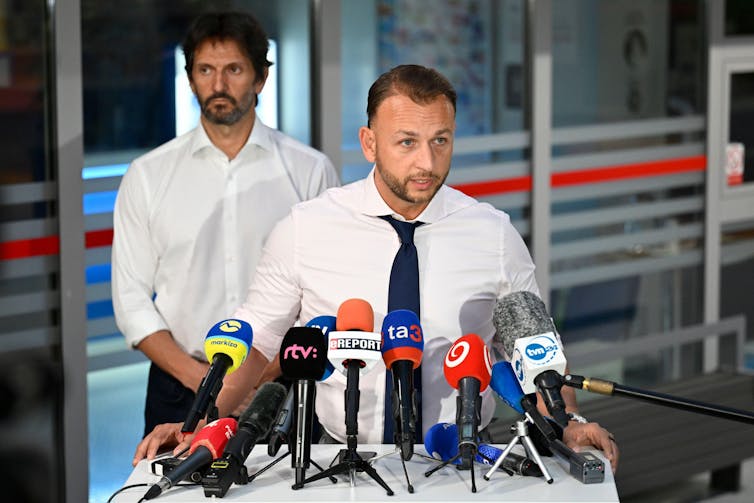The assassination attempt on Robert Fico, the prime minister of Slovakia, on May 15 has had a significant impact on Europe. Unfortunately, there are a high number of political assassinations in this region; in fact, the repercussions of the 2018 murder of investigative journalist Jan Kuciak in Slovakia are still being felt.
However, such attacks on politicians are exceedingly rare, with the exception of post-Soviet nations. It has been several decades since an individual of Fico’s prominence has been the subject of an attack. It remains excessively premature to postulate on a potential motive, despite the fact that the suspect in the shooting has been apprehended. As a result, it is almost certain that this will have a significant impact on the politics of Slovakia and the European Union as a whole.
Slovakia had been grappling with an exceptionally fraught political atmosphere even before the events of May 15. Fico and his Smer party have considerably dominated the national political landscape since the 2000s. He was the head of the government from 2006 to 2010 and 2012 to 2018, prior to the commencement of his current term in 2023.
Fico is purportedly a center-leftist in terms of his political beliefs. Nevertheless, his populist and nationalist policies are more similar to those of Viktor Orbán, the authoritarian far-right prime minister of Hungary, in a number of ways. Smer was previously a member of the Party of European Socialists in the European Parliament; however, its affiliation was revoked in late 2023 due to its progressive inclination toward the right.
Fico is, like Orbán, one of the most fervently pro-Russian political leaders in Europe. His platform for the 2023 election was the termination of Slovakia’s military and financial aid to Ukraine
American media outlets seized the opportunity to accuse Ukraine of planning the attempted assassination of Fico. Margarita Simonyan, the editor of RT, argued that Ukraine “should be held accountable” for the assassination. Importantly, there is currently no evidence that establishes a connection between the attack and Ukraine. In a personal statement, President Volodymyr Zelenskyy condemned the attack and expressed his solidarity with the Slovakian people. He also extended his best wishes for Fico’s recovery.
This assault has implications on both the domestic and regional levels. It is likely that the level of tension within Slovakia will rise. The election campaigns have become increasingly contentious since Fico’s initial inauguration in 2006, when he formed a coalition with the Movement for a Democratic Slovakia and the Slovak National Party, both of which are illiberal and nationalist organizations.
This was particularly evident during the 2023 elections, when Slovakia’s stance on the Russia-Ukraine War was a significant concern. At approximately that juncture, a Eurobarometer survey identified the conflict as the nation’s most pressing concern, despite the nearly 50/50 divide in support for either aiding or opposing Ukraine.
This polarization has already been evident in the responses of government and opposition politicians to the attempted assassination.
Matutaj-Eštok, the Interior Minister, declared that the attack was “politically motivated” and posed a threat to the nation’s stability. In a nation that has recently experienced incidents of violence against journalists, Utaj-Etok and his colleague Lubos Blaha have both criticized the “liberal media” for promoting “hatred.” This is a cause for concern.

Defense Minister Robert Kalinak and Interior Minister Matus Sutaj Estok address the media at the hospital where Fico is receiving treatment.
Alary/AP/Denes Erdos
In light of these remarks and the deplorable state of media freedom in the Visegrad region, which encompasses the Czech Republic, Hungary, Poland, and Slovakia, it is not surprising that a reprisal would take place.
Fico’s implementation of plans to transfer the Slovak national broadcaster to government control prior to the attack elicited public indignation. Concerns may also arise regarding the potential for the Slovak democratic system to be subjected to duress. Fico was once again embroiled in a verbal dispute with the nation’s highest court and had issued a warning that he was intently observing the body prior to the assault.
It is highly likely that the assault will function as an additional front in the ongoing information war between Russia, the European Union, and Ukraine, beyond the borders of Slovakia.
Ultimately, the veracity or precision of Russia’s allegations regarding Ukraine’s involvement may be rendered irrelevant. In the present environment, it has been demonstrated that disinformation is obstinately difficult to refute and challenge.
The assault on Fico has the potential to exacerbate an already tumultuous atmosphere by introducing an additional level of unpredictability, given the simultaneous occurrence of a significant Russian offensive in eastern Ukraine and the electoral campaigns for the European Parliament.







